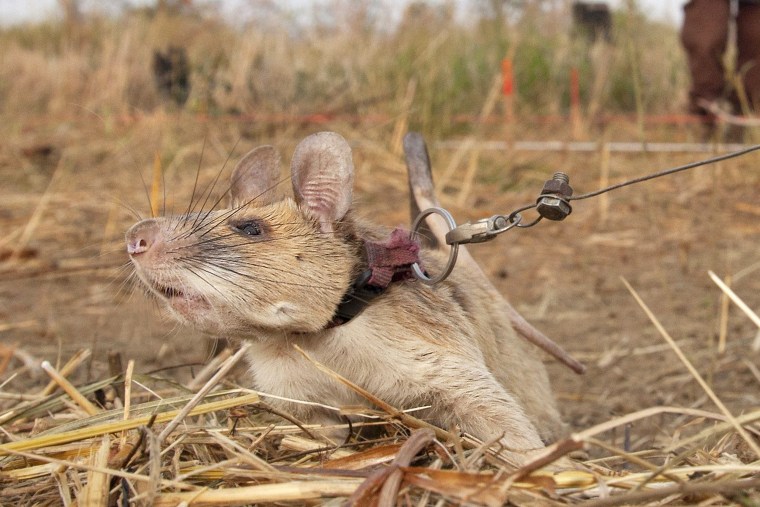He was dubbed a “hero rat” after he sniffed out more than 100 land mines and other explosives in Cambodia.
But after a short retirement, Magawa died Sunday, according to the Belgium-based charity APOPO, which trained him in Tanzania before assigning him to the Southeast Asian country in 2016.
The African giant pouched rat “was physically strong, so every day he searched more land than other rats, and found more mines than others,” Michael Heiman, APOPO’s Cambodia program manager, told NBC News on a phone call Wednesday.
“Because the handlers loved him so much, they utilized him more than others, which is also a factor in why he found so many items,” he added.
Announcing the rat's retirement in June last year, APOPO said in a news release that Magawa had found 71 land mines and 38 unexploded ordnances, making him the “most successful” mine-clearing rat. Over his five-year career, he helped to clear more than 225,000 square feet of land, it added.

Using an excellent sense of smell and memory, the rats can search an area the size of a tennis court in 30 minutes, something that would take a human with a metal detector up to four days, the charity, which also trains the creatures to detect tuberculosis, says on its website.
Light enough not to set off the mines, they are taught to ignore scrap metal and only sniff out explosives, it says, adding that they take around nine months to train.
Cambodia has among the highest number of amputees per capita, with more than 40,000 people having lost limbs to explosives.
An estimated 5 million land mines were laid in Cambodia during a civil war in the Southeast Asian country from 1975 to 1998, mainly in the northern region along the Thai border — leaving agricultural land unsafe to farm and impacting communities and livelihoods. More than 386 square miles of land are still contaminated.
Heiman said that Magawa’s handlers had noticed a decline in his agility and movement owing to his old age. The creature was 8 at the time he died, the equivalent of 100 in human years, he added.
Magawa was awarded a gold medal for his lifesaving work by the People’s Dispensary for Sick Animals, a British veterinary charity, in 2020. He was the first rat to receive the award.
Rebecca Buckingham, the charity’s awards manager, said Wednesday that he was “a very worthy recipient of the medal.”
She added that his legacy “will live on for decades to come in the lives he has helped to save through his incredible work detecting land mines in Cambodia.”